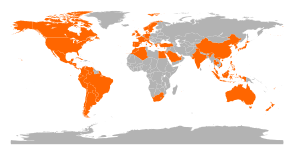Swine flu, in-depth: worldwide report
Thursday, September 17, 2009
The H1N1 outbreak of swine flu, which began in Mexico this April, has now spread across the globe. There have been at least 3,330 deaths from the swine flu since the virus started spreading, out of almost 316,000 total reported cases.
Nine countries — Australia, Brazil, France, Italy, New Zealand, Norway, Switzerland, the UK, and the US — have promised to send ten percent of their antiviral vaccine supply to other countries, should the latter be in need of it. The plan was agreed to "in recognition that diseases know no borders and that the health of the American people is inseparable from the health of people around the world," a statement by the US government read.
In an in-depth report, Wikinews takes a look at how the disease has affected countries around the world.
As of Wednesday, Brazil has registered 899 deaths from the swine flu, making it the hardest-hit country in terms of fatalities. The city of Sao Paulo reported 327 deaths, and Rio de Janerio 84.
However, the country's health ministry also said that the rate of serious cases "fell for the fifth straight week."
Brazil had surpassed the United States, which has 593 deaths, in number of total fatalities from the outbreak late in August.
Argentina, Brazil's neighbour to the south, has 512 deaths from the H1N1 virus.
10,000 cases of swine flu were confirmed across China since the outbreak began. The number of infections seems to be increasing quickly.
Communications director for the World Health Organisation Vivian Tan said that "in the last week or so, the increase has been quite quick," attributing the rise to a small decrease in temperatures as fall sets in, as well as students returning to school after summer breaks.
China's official news agency Xinhua reported that 1,118 new cases of the influenza were reported in a two-day period earlier in the week, adding that a vast majority of the cases had been transmitted in China, not by persons entering the country from abroad.
All 31 of China's provinces have reported instances of the flu. The disease initially seemed to be limited to large cities, but recently has started moving into more rural areas.
No casualties from the swine flu have yet been confirmed in China.
The office of France's president Nicolas Sarkozy said that the country would pledge up to one tenth or nine million of its 94 million antiviral vaccine doses to the World Health Organisation, to be distributed to countries with fewer vaccine supplies if needed.
International solidarity "will be a determining factor in reducing the health, economic and social impact of the pandemic," according to a statement released by the government.
On Wednesday, eleven people had been reported dead from the virus in India, taking the country's death toll up to 212 people. The number of people infected with the influenza is now estimated at 6,800.

██ Confirmed cases followed by death
██ Confirmed cases
██ Unconfirmed or suspected cases
See also: H1N1 live map, WHO updates
██ 5000+ confirmed cases
██ 500+ confirmed cases
██ 50+ confirmed cases
██ 5+ confirmed cases
██ 1+ confirmed cases
See also: H1N1 live map, WHO updates
██ 0 deaths
██ suspected deaths
██ 1+ deaths
██ 5+ deaths
██ 10+ deaths
██ 50+ deaths
██ 100+ deaths
See also: H1N1 live map, WHO updates
██ Confirmed community outbreaks
See also: H1N1 live map, WHO updatesIndia's health ministry on Tuesday said that the Tamiflu drug would be on sale in the open market within seven days, allowing for a "restricted sale" of the drug.
An unnamed official said that "it is expected that within the next five to seven days, both the drugs would be available in the retail market through identified chemists against proper medical prescriptions.
"Taking into account the current spread of the influenza A(H1N1) in the country, the health ministry has decided that retail sale of Tamiflu and Zanamivir should be allowed in the country but in a regulated manner," he said.
Previously, distribution of Tamiflu was prohibited by the government, and access to it was only available through public health institutions.
At least 70 people in Kenya have the swine flu, according to local health official. In the latest outbreak, twenty high school students came down with the virus and had to be quarantined on Thursday.
"A majority of the affected students who are in Forms One and Two were treated and advised to remain under bed rest to minimise further spread of the disease among the student community," said the director of Public Health, Dr. Shanaaz Shariff. However, he said that the students' illness was "not too serious to warrant hospitalisation."
Security guards were placed around the school the students were isolated in, with orders only to allow medical personnel to enter the premises.
Kenya's capital Nairobi has been the worst hit by the flu, having reported forty cases. Other cities affected by the flu are Kisumu and Rift Valley, who have reported eighteen and ten cases of the H1N1 virus, respectively.
Mexico, the country in which the outbreak initially started, has 25,214 reported cases and 217 fatalities from the virus. Some recent cases have forced schools to close down.
Jose Angel Cordova, the Mexican health secretary, said that the virus could infect as many as five million of Mexico's 107 million people, and, in a worst-case scenario, cause up to 2,000 deaths. His estimate is higher than his previous prediction of 1 million cases and 1,000 deaths, made last month.
About five thousand new cases of swine flu were reported in the United Kingdom in recent weeks, reversing a declining trend in the number of new infections. Health officials have suggested this could lead up to a second outbreak of the virus.
"We don't know whether this is the start of the next big wave that we were expecting this autumn but it is certainly something that's giving us concern. It will probably be a week or two before we see whether this increase is sustained." said Liam Donaldson, the Chief Medical Officer.
Health authorities have said that at least 25 cases appear to have been resistant to the Tamiflu drug prescribed to treat the illness.
Donaldson said that "the positive side of it is that so far these have not been strains that have then gone on and affected other patients, they have stayed with the patient in which they were isolated. What would worry us is if we got a resistant strain that then started infecting people like the rest of the cases of flu that have occurred."
The UK is one of several countries that have pledged up to one tenth of their vaccine stock to to other countries if they are in need of more supplies. "[Britain] recognizes that H1N1 is a global pandemic which requires a global response," the International Development Secretary, Douglas Alexander, said. "Solidarity with other nations is vital, particularly the poorest who may be most vulnerable and have least capacity to respond."
The US government recently bought 195 million doses of swine flu vaccine. Health Care Secretary Kathleen Sebelius said that free shots will be given out early in October. The vaccination is to be voluntary, but priority will be given to certain groups, such as toddlers and children, adults over the age of 65, and pregnant women, who are considered especially vulnerable to the virus.
"We remain confident that the United States will have sufficient doses of the vaccine to ensure that every American who wants a vaccine is able to receive one," a White House statement said.
As of September 16, the US had 593 deaths from the flu.
144 people in Vietnam were diagnosed with the swine flu on Wednesday, bringing the total number of infected people in the country to 5,648. This week, the number of affected people has increased by 1104 infections or 6.3%.
Nguyen Tran Hien, the director of the Central Institute of Hygiene Epidemiology, predicted that the swine flu would peak at the end of 2009 and the beginning 2010.
The Vietnamese Ministry of Health called for more research into a swine flu vaccine, and urged the the National Steering Board on Flu Prevention in Humans to give out more doses of the drug Tamiflu to areas hardest hit by the flu.
Related news
- "Swine flu: recent developments worldwide" — Wikinews, June 6, 2009
- "Swine flu worldwide: update" — Wikinews, May 3, 2009
- "Swine flu outbreaks appear globally; WHO raises pandemic alert level to 5" — Wikinews, April 29, 2009
- "Swine flu reported in more countries; WHO warns of possible pandemic risk" — Wikinews, April 28, 2009
- "Outbreak of swine flu in Mexico kills at least twenty, infects 1,000" — Wikinews, April 24, 2009
Sources
- "Swine flu outbreak dashboard" — theAirDB, Retrieved September 17, 2009
- Associated Press. "Mexico says millions of swine flu cases possible" — Google News, September 17, 2009
- "China set for a tough winter of H1N1 flu." — Canada.com, September 17, 2009
- "US, Europe offer swine flu vaccine to nations in need" — Agence France-Presse, September 17, 2009
- "Late treatment caused swine-flu deaths in Vietnam, says official" — Saigon-GP Daily, September 17, 2009
- Mike Mwaniki. "20 Kenya students contract Swine Flu" — Daily Nation, September 17, 2009
- "Concern as British swine flu numbers rise again" — Reuters UK, Setpember 17, 2009
- "India's swine flu toll 212, Tamiflu sales allowed" — Sify News, September 16, 2009
- Agence France-Presse. "Brazil registers 899 swine flu deaths: official" — Google News, September 16, 2009



